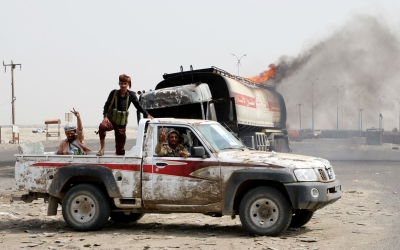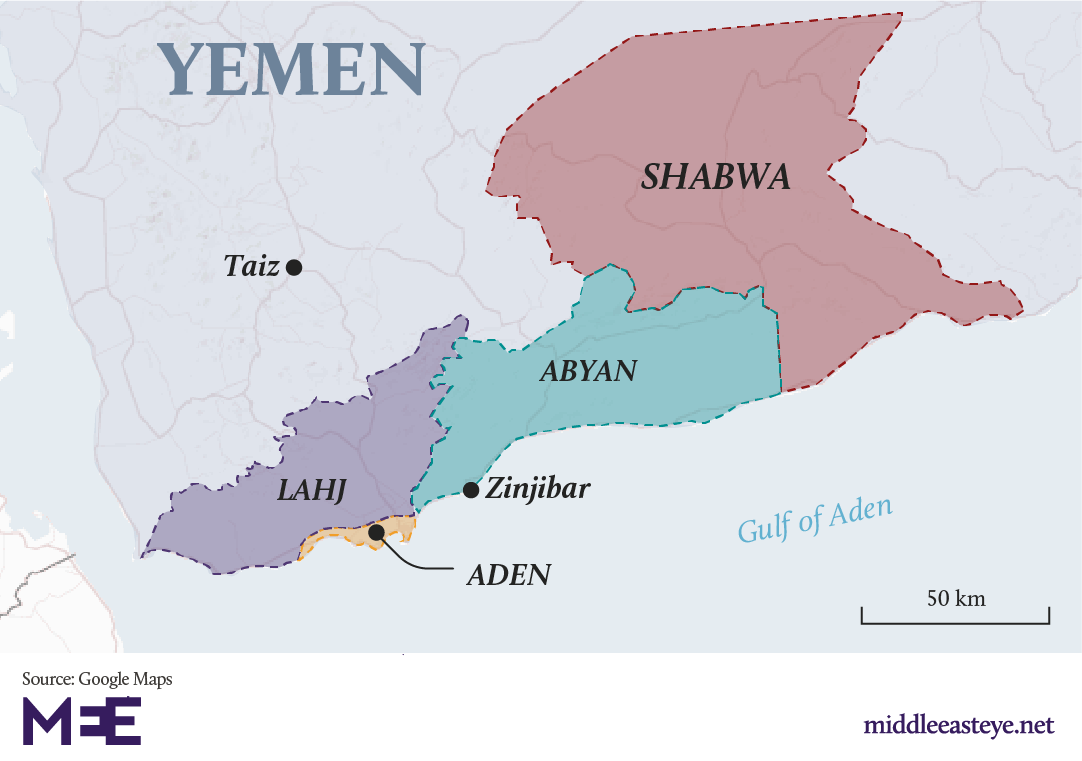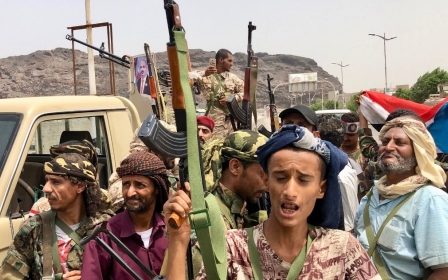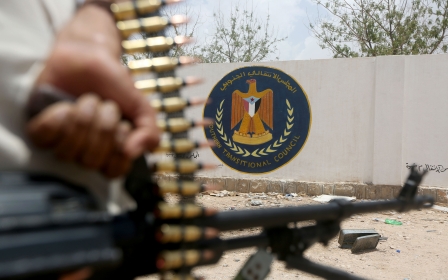Yemen's President Hadi calls on Saudi Arabia to rein in UAE-backed separatists
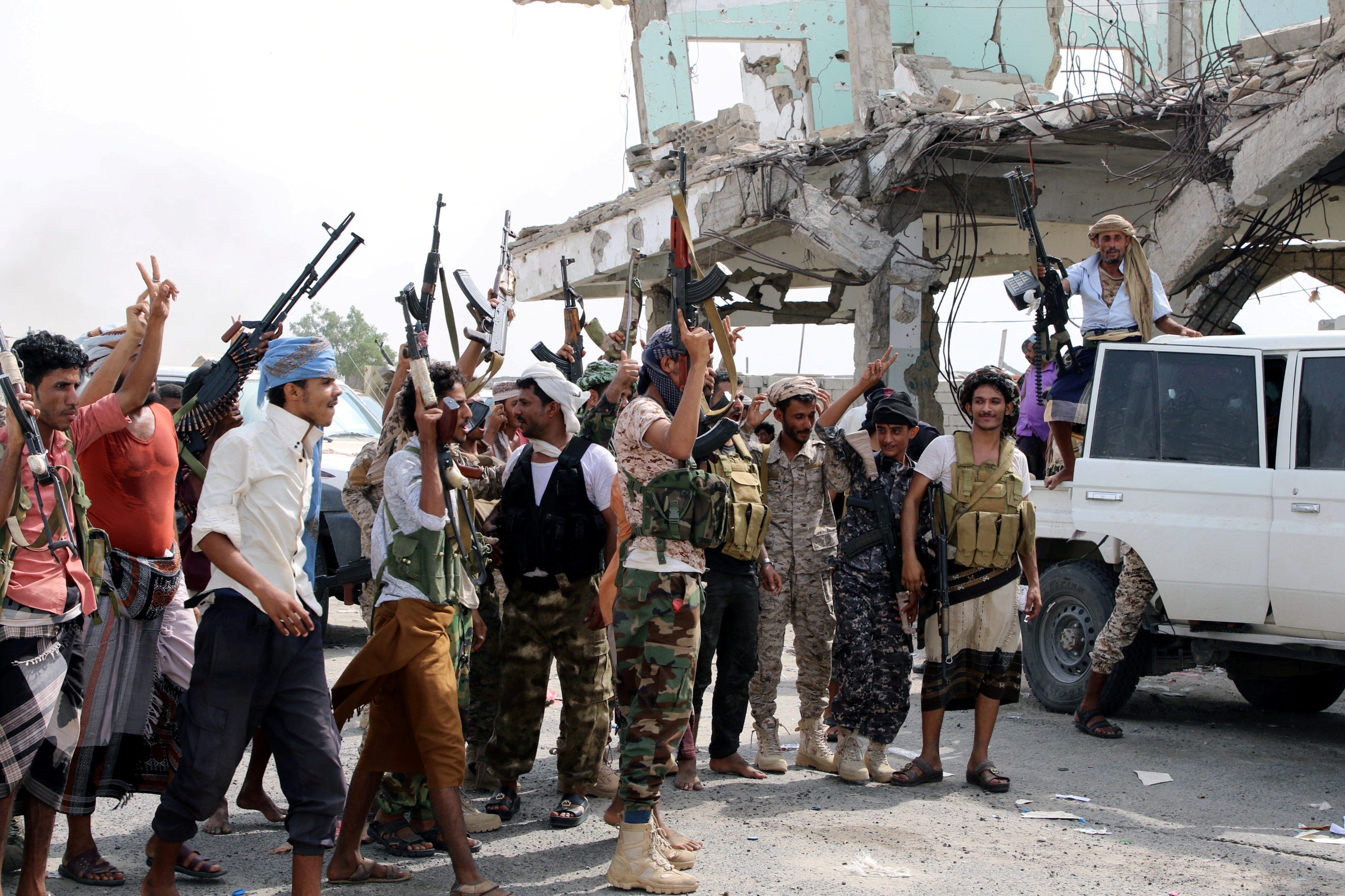
Yemen's internationally recognised President Abd Rabbuh Mansour Hadi called on Saudi Arabia to help stop United Arab Emirates air strikes on his temporary capital Aden, as he withdraws his forces from the port city.
A Western-backed coalition led by Saudi Arabia and the UAE intervened in Yemen in 2015 to try to restore Hadi's government, which had been ousted from power by Houthi rebels. His troops lost control of the city to separatists earlier this month.
New MEE newsletter: Jerusalem Dispatch
Sign up to get the latest insights and analysis on Israel-Palestine, alongside Turkey Unpacked and other MEE newsletters
Since then, Hadi's troops have been battling for the city with the UAE-backed Security Belt Forces (SBF), the military wing of the Southern Transitional Council (STC) separatist movement seeking independence for Yemen’s south.
On Thursday, Hadi asked Saudi Arabia to intervene and stop what he called UAE interference and support for the SBF, according to state news agency Saba, as reported by Reuters news agency.
Hadi said that his forces had withdrawn from Aden to prevent the city from being destroyed, Reuters reported, as fighting for control of the key port city continued.
Hadi also asked for all air strikes against Yemeni government forces to be halted.
Earlier on Thursday, the UAE claimed responsibility for air strikes carried out in Aden against what it called "terrorist organisations", Reuters said.
Still, Hadi's government called the air strikes an "illegal, blatant attack", insisting the UAE take full responsibility and demanding it end its financial and military support for the SBF.
“The Yemeni government reserves the legal right, which is guaranteed by the international law and the United Nations Charter, to do the required procedures to stop this attack and dangerous escalation,” the government said in a statement on Thursday.
The UAE said its air strikes were in response to attacks on Saudi-led coalition forces and the city's airport, according to a statement cited by UAE state news agency WAM later in the day, Reuters said.
The UAE called for an international response against the attackers, the statement said.
The situation in south Yemen is constantly shifting under frequent territorial exchanges between the UAE-SBF and troops loyal to the Saudi-supported Hadi government.
Earlier on Thursday, the SBF recaptured parts of Aden city and Abyan province from fighters loyal to Hadi.
At the time, Hadi's forces had been gathering around the Abyan village of al-Alam, preparing to launch a counterattack and take back parts of Aden.
South Yemen: Timeline of a civil war within a civil war
+ Show - Hide1 August: A missile attack claimed by the Houthis kills dozens of Security Belt Forces (SBF) officers at a military parade near Aden, including a leading SBF commander, Brigadier General Munir “Abu al-Yamama” al-Yafee. The Houthis claim responsibility, but the UAE-backed Southern Transitional Council (STC), the SBF's political wing, blame the attack on al-Islah, which it said had infiltrated President Abd Rabbuh Mansour Hadi's government and military, including the presidential guard stationed at al-Maashiq presidential palace in Aden.
7 August: Gunshots are reportedly fired at Yafee's funeral, which was held near Aden's presidential palace. Fighting breaks out between SBF fighters and presidential guards at the palace entrance. The STC claims 11 of its members were killed in the exchange of fire. Later that evening, STC Vice Chairman Hani bin Breik calls for supporters to march on the presidential palace to overthrow Hadi's government.
8 August: At least 12 people are killed in renewed clashes between the SBF and pro-Hadi forces in Aden.
9 August: Renewed clashes kill at least six civilians in Aden.
10 August: The STC captures Aden after a fierce battle with loyalist forces. At least eight civilians are killed in the fighting. The Saudi-backed government accuses the STC of staging a coup in the southern port city after its fighters seized all military camps, prompting Riyadh to call for an urgent meeting for the warring parties.
20 August: SBF fighters encircle a pro-government special forces camp in the Zinjibar, the capital of Abyan province. The special forces camp and a nearby military base both fall under the control of the SBF.
22 August: The Shabwani Elite Forces (SEF), a militia loyal to the STC, attacks government forces in the Shabwa province and captures several areas, including its capital city of Ataq.
24 August: Pro-government forces recapture Ataq.
28 August: Pro-government forces recapture Abyan province and Hadi's information minister announces Aden has been taken back and its presidential palace seized.
29 August: STC forces regain parts of Aden city and Abyan province. The UAE claims responsibility for airstrikes against what it calls "terrorist organisations", and Hadi calls on Saudi Arabia rein in the separatists, saying his forces have withdrawn from the city to prevent further destruction.
14 October: Saudi Arabia’s armed forces take control of Aden, deploying more troops to replace the Emiratis at Aden airport and military bases in the city. Official handover to a Saudi commander took place the previous week.
30 October: The UAE announces its troops have left Aden, handing over control to Saudi Arabia.
5 November: Yemen's internationally recognised government and southern separatists signed a Saudi-brokered agreement to end their power struggle.
On Wednesday, US Secretary of State Mike Pompeo met with Saudi Deputy Defence Minister Khalid bin Salman, with the secretary reiterating US support for a negotiated resolution between Yemen's government and the STC.
"The secretary and the minister agreed that dialogue represents the only way to achieve a stable, unified, and prosperous Yemen," the State Department said in a statement.
Middle East Eye delivers independent and unrivalled coverage and analysis of the Middle East, North Africa and beyond. To learn more about republishing this content and the associated fees, please fill out this form. More about MEE can be found here.


